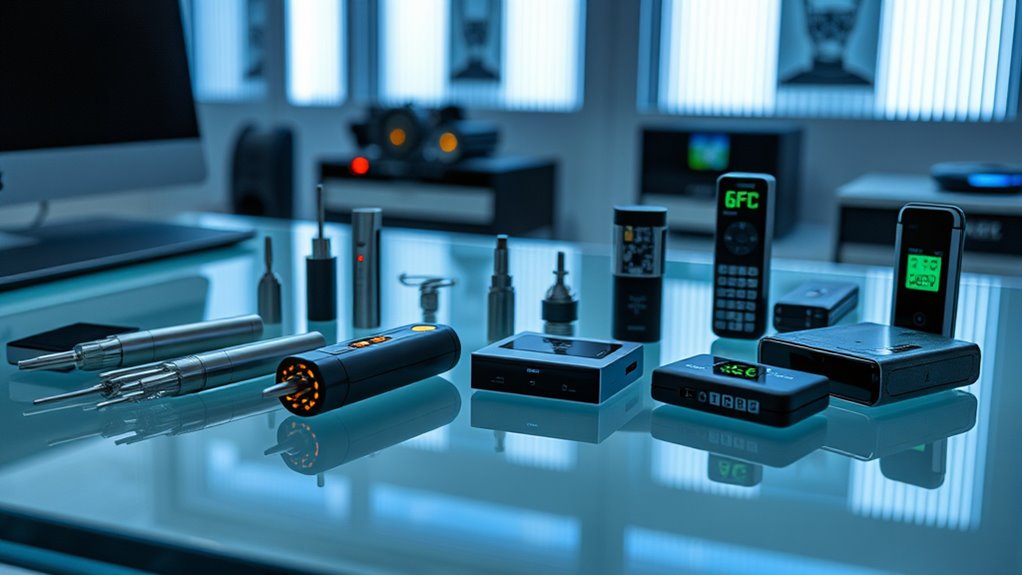If you’re searching for the best RFID cloning tools of 2025, I’ve got you covered. From handheld devices that support multiple frequencies and card types to portable duplicators with user-friendly interfaces, there’s a wide range of reliable options for security enthusiasts. These tools excel at reading, writing, and emulating RFID and NFC cards for various applications. Keep exploring to discover which device best suits your needs and how to use them effectively.
Key Takeaways
- Features versatile multi-frequency support (125kHz and 13.56MHz) for broad RFID system compatibility.
- Includes user-friendly interfaces with touchscreens, voice prompts, and manual input for easy operation.
- Offers high reusability with multiple read/write cycles, suitable for cloning access cards, key fobs, and security tokens.
- Supports portable power options like rechargeable batteries and USB, ideal for on-site and field use.
- Compatibility varies; some devices handle encrypted or high-security RFID cards when connected to a computer.
Handheld RFID ID Copier and Duplicator with T5577 Compatibility
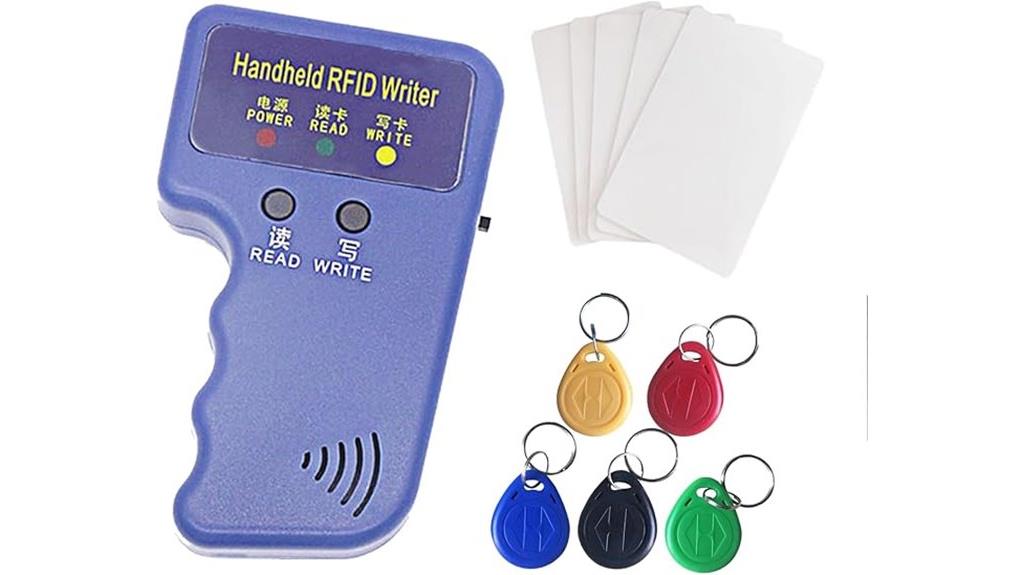
If you’re looking for a reliable tool to clone low-frequency RFID cards, the Handheld RFID ID Copier with T5577 compatibility is an excellent choice. I’ve used it to duplicate various RFID cards, including parking and access cards, thanks to its compatibility with T5577, EM4100, EM4305, and TK4100 chips. The device is lightweight, easy to operate, and allows direct copying with a simple workflow. It produces a buzzing sound and indicator light confirming operation. Keep in mind, each card can only be copied once unless reprogrammed. It’s perfect for those needing a versatile, portable RFID duplicator for low-frequency cards.
Best For: individuals or businesses needing a portable and versatile device to clone low-frequency RFID cards like access, parking, or switch cards.
Pros:
- Compatible with multiple low-frequency RFID chips including T5577, EM4100, EM4305, and TK4100 for wide applicability
- Compact, lightweight design (56g) makes it easy to carry and operate on the go
- Simple workflow with audible and visual indicators ensures straightforward duplication process
Cons:
- Can only copy each card once unless reprogrammed, limiting multiple duplications
- Requires users to input specific low-frequency commands before copying, adding a step to the process
- Cannot perform direct read/write operations without prior command input, which may be confusing for some users
RFID Handheld ID Copier and Duplicator (T5577 Compatible)
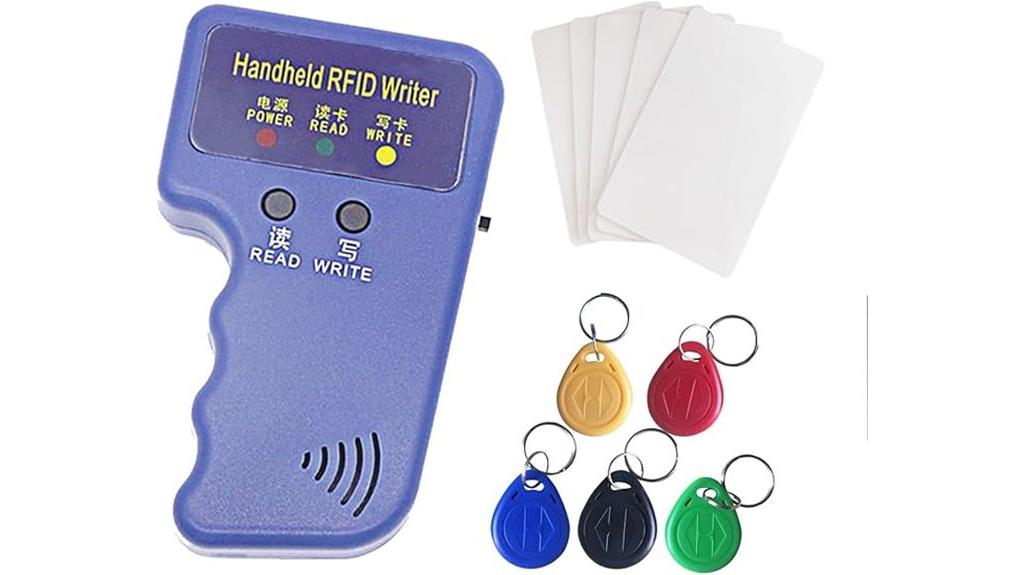
The RFID Handheld ID Copier and Duplicator (T5577 Compatible) stands out as an essential tool for security professionals and hobbyists who need a compact, portable device capable of copying low-frequency RFID chips. Weighing just 56 grams, it supports reading, writing, and direct copying of T5577 chips found in keyfobs, cards, and hidden tags. The device requires two AAA batteries and emits a buzzing sound during operation. It can only replicate each card once unless reprogrammed, making it ideal for single-use applications. Its compatibility with all low-frequency 125kHz RFID products makes it versatile for access control, parking cards, and switch cards.
Best For: security professionals and hobbyists needing a portable, reliable tool for copying and cloning low-frequency RFID chips like T5577 in access control, parking, and switch card applications.
Pros:
- Compact and lightweight (56g), easy to carry and operate on the go
- Supports direct copying, reading, and writing of T5577 chips with simple workflow
- Compatible with all low-frequency 125kHz RFID products, offering versatile use
Cons:
- Can only replicate each card once unless reprogrammed, limiting repeated use
- Requires batteries (2 AAA 1.5V) and proper chip type verification for compatibility
- Cannot directly operate with non-T5577 chips like EM4100 or TK4100 without reprogramming
Handheld RFID Copier with 6 T5577 Cards and Reader Writer
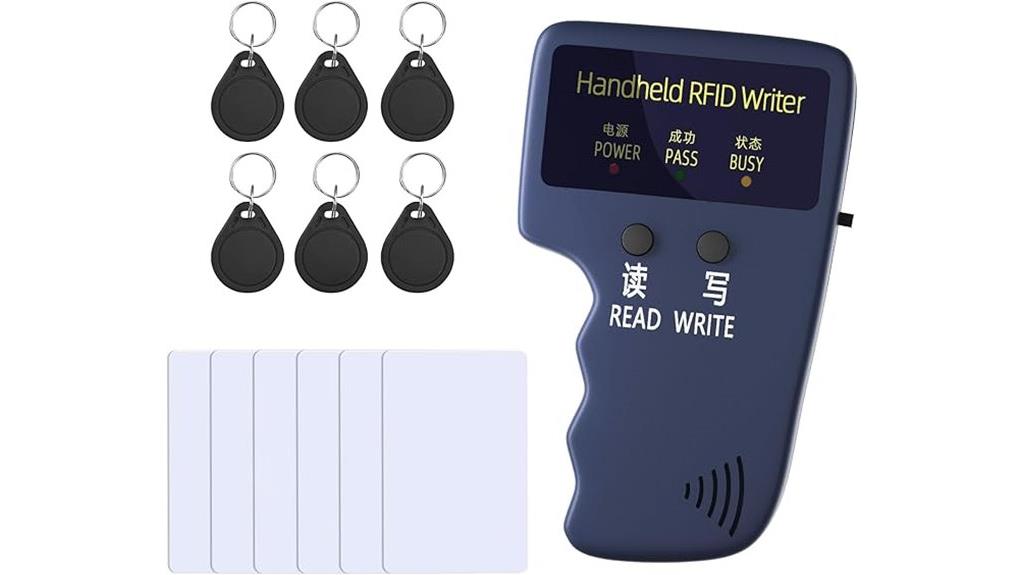
For professionals seeking a compact and portable RFID cloning device, the Handheld RFID Copier with 6 T5577 Cards and Reader Writer stands out. Weighing just 5.6 ounces and powered by two AAA batteries, it’s perfect for on-site copying of RFID cards like parking, access, and switch cards. It supports 125kHz RFID chips, including T5577 and EM4305, allowing unlimited scans and reuse of proximity cards. Its small size makes it easy to carry, and it’s straightforward to use—just read the original card, then write data onto blank cards. Users appreciate its affordability, effectiveness, and convenience for quick, on-the-go RFID duplication.
Best For: professionals and security personnel who need a portable, easy-to-use RFID cloning device for on-site duplication of access, parking, or switch cards.
Pros:
- Compact, lightweight, and portable design for easy on-the-go use
- Supports multiple reuse of RFID cards with reliable reading and writing capabilities
- Compatible with 125kHz T5577 and EM4305 chips, covering a wide range of market RFID cards
Cons:
- Requires two AAA batteries, which may need frequent replacement for continuous use
- Some users report difficulty understanding the instruction manual or setup process
- Build quality and LED indicators may be less durable or clear compared to higher-end devices
Handheld 125kHz RFID Card Duplicator with Keychains and Cards
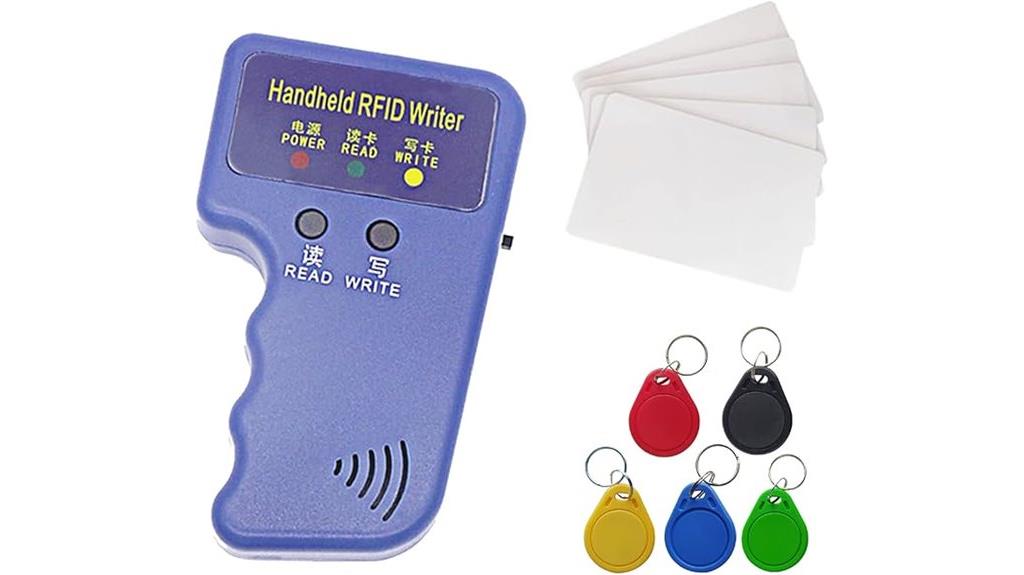
This handheld 125kHz RFID card duplicator stands out for its compact design and ease of use, making it ideal for professionals who need quick and reliable cloning of low-frequency RFID cards. Weighing only 56 grams, it supports a range of chips like T5577, EM4100, EM4305, and TK4100, enabling read, write, and copy functions for access cards, parking tags, and switch cards. The device requires manual pre-programming—reading the original card, then writing the command into blank cards or keychains. Its portability and simplicity make it perfect for on-the-go cloning tasks, with the ability to reuse the device infinitely once set up correctly.
Best For: professionals and security personnel needing portable, efficient RFID card cloning for access control, parking, or switching applications.
Pros:
- Lightweight and compact design for easy portability and on-the-go use
- Supports multiple low-frequency RFID chips including T5577, EM4100, EM4305, and TK4100
- Reusable infinitely once programmed, enhancing cost-effectiveness and convenience
Cons:
- Requires manual pre-programming (reading and writing commands) for operation
- Limited to one replication per operation, needing careful handling
- No automatic or wireless operation; depends on manual operation and batteries
Keysy RFID Duplicator for 125kHz Key Fobs and Cards
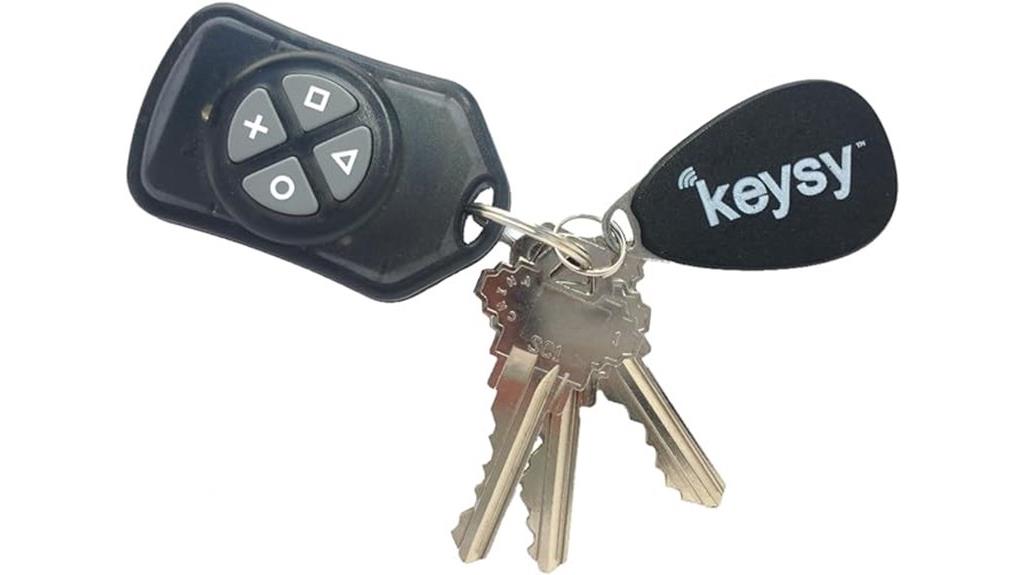
If you’re looking for an easy-to-use, affordable tool to clone 125kHz RFID key fobs and cards, the Keysy RFID Duplicator stands out as a top choice. It copies popular access credentials like HID Prox, AWID, and Indala onto rewritable Keysy fobs or stickers, which you can place on phones or accessories for convenience. The device allows copying up to four cards at once and supports emulation for seamless access. It’s simple to operate—just hold the device over the original card during copying. While not all readers are compatible, many users find it a cost-effective solution for backups or sharing access without expensive replacements.
Best For: individuals or small businesses seeking an affordable, easy-to-use solution for cloning and backing up 125kHz RFID access cards and fobs.
Pros:
- Simple operation requiring only holding the device over the original card during copying
- Supports cloning of multiple cards at once and emulation for seamless access
- Cost-effective alternative to purchasing expensive building-issued fobs or cards
Cons:
- Compatibility issues with certain RFID readers or card types like AWID cards
- Not all readers support the emulation function, limiting usability in some cases
- Requires replacement of the battery and careful handling to ensure proper functioning
RFID Reader Writer Emulator and Copier for Access Control Systems
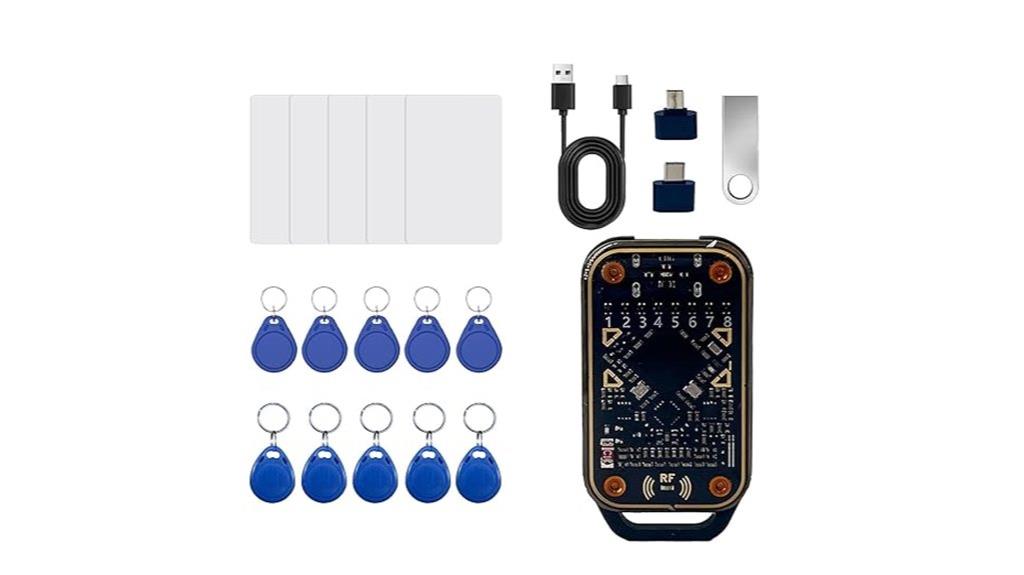
The Chameleon Ultra stands out as an ideal choice for security professionals and hobbyists seeking a versatile RFID cloning tool. It functions as a full-featured emulator, reader, writer, and copier, supporting multiple card types including 125kHz ID cards and 13.56MHz IC cards. With eight slots for simultaneous simulation, it can test and clone various access control systems effortlessly. Its Bluetooth connectivity makes switching between cards quick and convenient. Compact and portable, it’s perfect for on-the-go testing and system validation. While it requires original cards for copying and has some firmware stability issues, it remains a powerful device for managing RFID security across diverse applications.
Best For: security professionals, hobbyists, and engineers seeking a versatile and portable RFID cloning and testing device for access control systems.
Pros:
- Supports multiple card types including 125kHz ID and 13.56MHz IC cards, enabling broad compatibility.
- Features 8 card slots for simultaneous simulation, enhancing testing efficiency.
- Bluetooth connectivity allows easy switching and management via smartphones.
Cons:
- Requires original cards for copying, limiting its use with unknown or unowned cards.
- Firmware stability issues can affect updates and overall device performance.
- Limited to 3-5 uses per day on a single charge, which may be restrictive for intensive testing.
RFID Copier and Reader with Software for Access Control
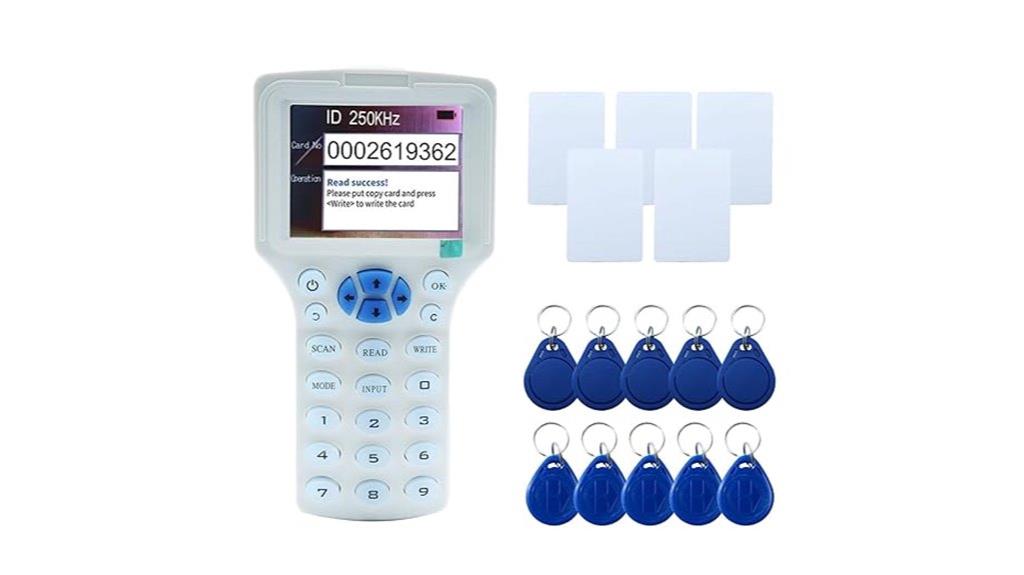
Designed for security professionals and access control administrators, RFID copiers and readers with integrated software streamline the process of cloning and managing RFID cards. They support multiple frequencies, including 125KHz and 13.56MHz, making them compatible with HID, elevator, parking, and attendance cards. These devices enable seamless reading, writing, and cloning, with easy operation through a color touchscreen and voice prompts. Connecting via USB or batteries, they facilitate quick card duplication. When working with encrypted 13.56MHz cards, connecting to a computer is essential. Overall, they offer a versatile, user-friendly solution for efficient access control management.
Best For: security professionals and access control administrators seeking an easy-to-use, multi-frequency RFID cloning and management solution with versatile compatibility.
Pros:
- Supports multiple RFID frequencies including 125KHz and 13.56MHz, ensuring broad compatibility with various cards.
- Features a user-friendly 2.75-inch HD color touchscreen with voice prompts for intuitive operation.
- Offers flexible power options via USB or batteries, enabling portability and ease of use in different environments.
Cons:
- Requires connection to a computer when working with encrypted 13.56MHz cards, adding complexity for some users.
- Battery operation depends on purchasing batteries separately, which may be inconvenient.
- Adjusting card position on the sensing area can be necessary if reading issues occur, potentially impacting workflow.
Handheld RFID Card Duplicator with 5 Rewrite Cards and Key Fobs

For those seeking an affordable and easy-to-use solution for duplicating common RFID cards and key fobs, the Handheld RFID Card Duplicator with 5 Rewrite Cards and Key Fobs stands out. It’s compact, lightweight, and wireless, making it perfect for quick on-site copying. Compatible with low-frequency 125kHz RFID chips like T5577, EM4305, and EM4100, it allows you to read and clone existing cards or fobs easily. Simply follow the straightforward steps—read, then write into blank cards or fobs. While it works well with older systems, it may struggle with newer, higher-security RFID devices. Overall, it’s a handy device for basic duplication needs.
Best For: users needing an affordable, easy-to-use RFID cloning device for duplicating older 125kHz cards and key fobs for home or small business access control.
Pros:
- Compact, lightweight, and wireless for easy portability and on-site use
- Compatible with common low-frequency RFID chips like T5577, EM4305, and EM4100
- Simple operation with straightforward read/write steps suitable for beginners
Cons:
- May not work with newer RFID systems featuring advanced security layers
- Limited feedback during read/write processes can make success confirmation difficult
- Compatibility issues with certain blank cards or fobs, requiring careful verification of chip type
X7 NFC RFID Card Copier Reader Writer Duplicator (5 Rewritable Cards & Keyfobs)

If you’re seeking an affordable and portable RFID cloning device that handles common low-frequency cards, the X7 NFC RFID Card Copier Reader Writer Duplicator is a solid choice. It supports multiple frequencies, including 125KHz and 13.56MHz, making it compatible with a wide range of cards like S50, EM4200, and HID Prox. The device features a 2.8-inch color TFT screen for easy navigation, manual card number entry, and can connect to iOS and Android devices via app. Weighing just over 3 ounces, it’s lightweight and ideal for basic cloning tasks. However, it struggles with encrypted cards and has limited software usability, making it best for simple, non-secure applications.
Best For: users seeking an affordable, portable RFID cloning device suitable for basic, non-encrypted low-frequency and high-frequency cards.
Pros:
- Compact, lightweight, and easy to operate with a user-friendly color display.
- Supports multiple frequencies and common RFID card types for versatile use.
- Connects to iOS and Android devices for convenient operation and firmware updates.
Cons:
- Limited functionality with encrypted or high-security RFID cards.
- Software interface can be unintuitive, with occasional freezing and poor translation.
- Basic build quality with plastic housing may affect durability over time.
125KHz RFID Reader Writer with 5 Writable Key Fobs
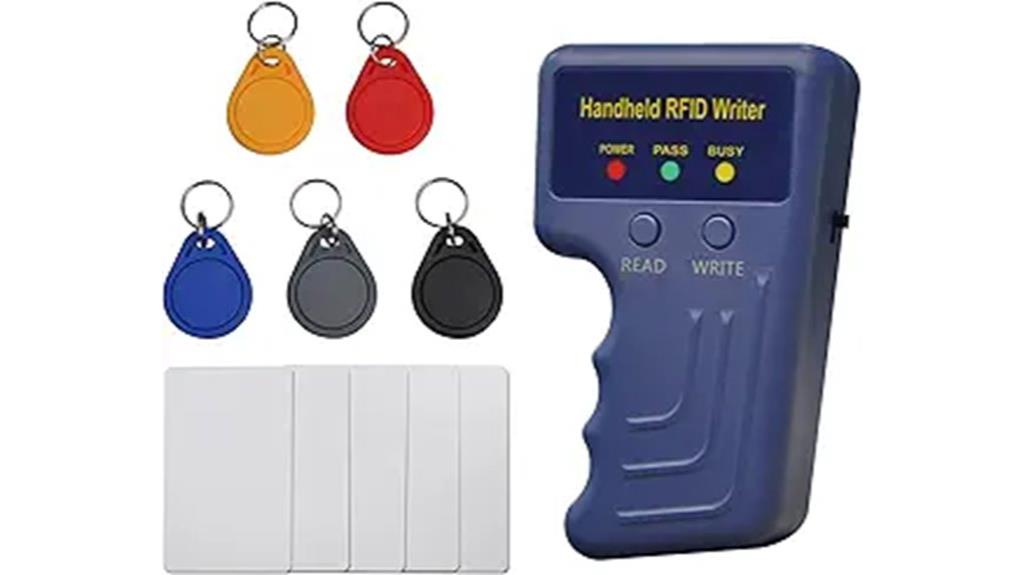
The KHz RFID Reader Writer with 5 Writable Key Fobs is an ideal choice for professionals and enthusiasts who need a reliable handheld device for duplicating low-frequency RFID cards. It supports 125KHz cards like CET5200, EN4205, AWID, and more, making it versatile for various access systems. The device is compact, lightweight, and designed with ergonomic features for easy handling. It includes five writable key fobs, allowing quick duplication. Powered by two AAA batteries, it’s simple to operate, but you may need some trial and error to achieve perfect copying. Overall, it’s a practical tool for secure access management, with compatibility and ease of use at its core.
Best For: professionals and enthusiasts needing a reliable handheld device for duplicating low-frequency 125KHz RFID cards and key fobs for access control.
Pros:
- Supports a wide range of 125KHz RFID card types including CET5200, EN4205, AWID, and more.
- Compact, ergonomic design with anti-slip ridges for easy handling and portability.
- Comes with 5 writable key fobs for quick duplication and versatile use.
Cons:
- Requires trial and error for successful copying due to variable device operation.
- Powered by two AAA batteries, which are not included, adding to ongoing costs.
- Supports only 125KHz frequency, so card compatibility must be verified before purchase.
Handheld 125kHz RFID Card Copier with 5 Rewrite Cards and Keychains
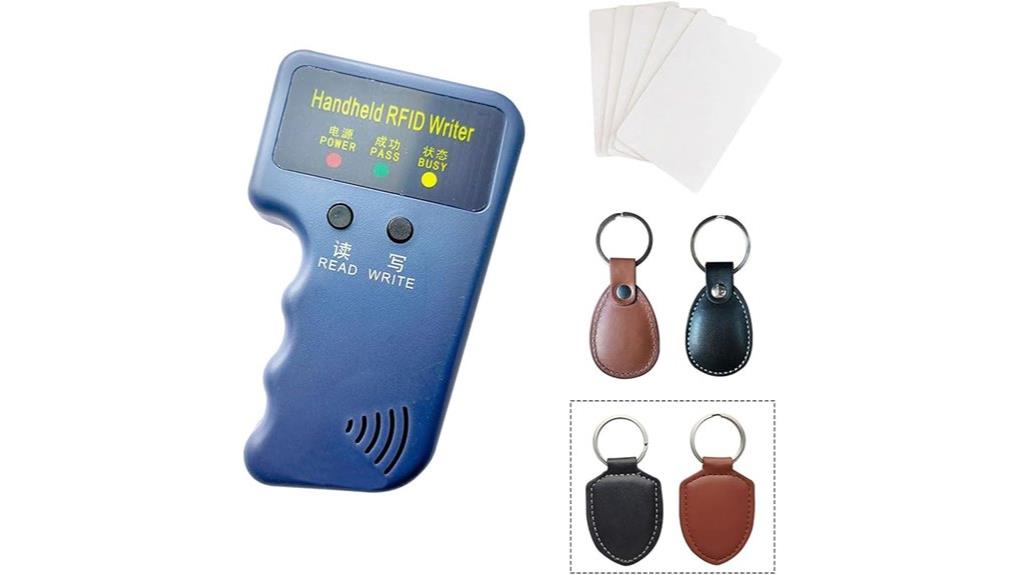
This handheld 125kHz RFID card copier stands out for its portability and ease of use, making it ideal for professionals who need on-the-spot duplication of low-frequency RFID tags. Weighing just 56 grams, it’s lightweight and perfect for on-site tasks. It supports T5577 chips and many low-frequency tags like parking, access, and switch cards—though not compatible with EM4100 or TK4100 chips. The package includes the copier, five writable cards, two keychains, and ID leather circles. To use it, you first read the data from an original card, then rewrite it onto blank cards or keychains. Its reusability and straightforward operation make it a versatile tool for RFID duplication.
Best For: professionals and security personnel needing portable, on-site RFID tag copying and duplication of low-frequency 125kHz RFID cards and keychains.
Pros:
- Lightweight and portable at only 56 grams, ideal for on-the-go use.
- Supports a wide range of low-frequency RFID tags, including T5577 chips and various access, parking, and switch cards.
- Reusable cards and keychains with straightforward read/write operations, enhancing versatility and cost-effectiveness.
Cons:
- Not compatible with certain chips like EM4100, EM4305, or TK4100; chip confirmation required before purchase.
- Requires reading device commands before writing data, adding a step to the duplication process.
- Some cards can only be duplicated once, which may limit repeated use depending on the card type.
RFID ID Duplicator Copier Writer with T557 125kHz & 13.56MHz Compatibility
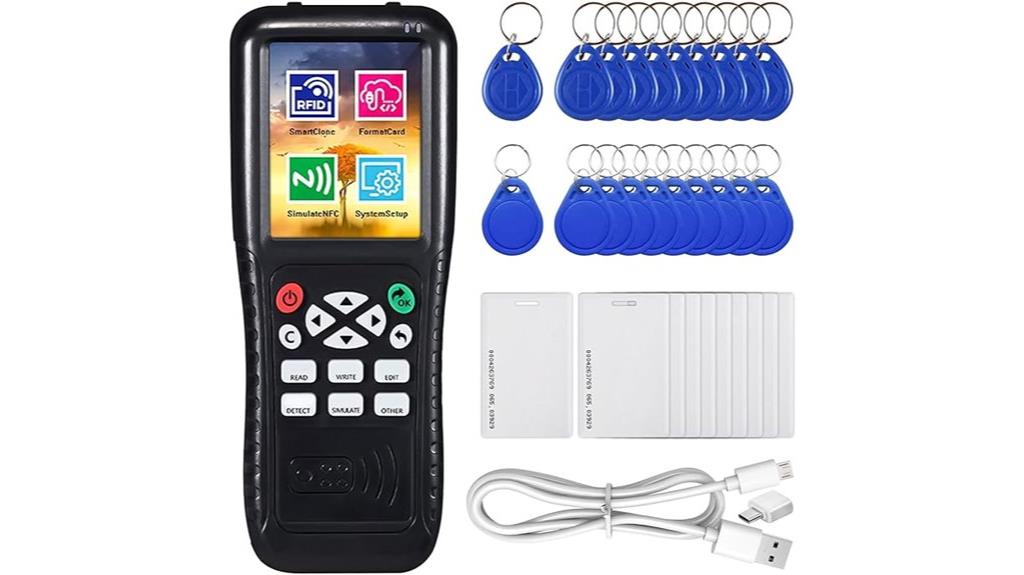
Designed for users who need versatile RFID cloning capabilities, the RFID ID Duplicator Copier Writer with T557 125kHz & 13.56MHz Compatibility supports a wide range of cards and tags, making it ideal for hobbyists, small business owners, and security professionals. It can read, copy, and write on RFID and NFC cards across multiple frequencies, including 125kHz and 13.56MHz. Compatible with many blank cards like UID, FUID, and CUID, it’s perfect for duplicating access cards and key fobs. However, it doesn’t support secured or encrypted cards like EM4100 or TK4100. A Windows PC is required, and the device’s interface is primarily in Chinese, with an option for English.
Best For: hobbyists, small business owners, and security professionals needing versatile RFID cloning and copying capabilities across multiple frequencies.
Pros:
- Supports a wide range of RFID and NFC cards, including UID, FUID, and CUID types.
- Compatible with multiple frequencies such as 125kHz and 13.56MHz, increasing versatility.
- Cost-effective solution for duplicating access cards and key fobs without requiring expensive equipment.
Cons:
- Does not support secured or encrypted cards like EM4100, TK4100, or IC MF1 S50.
- Requires a Windows PC and cannot operate on macOS, limiting platform compatibility.
- Limited software features; cannot display or edit card codes directly, only copy and read data.
Chameleon Ultra RFID Emulator for Access Control Systems
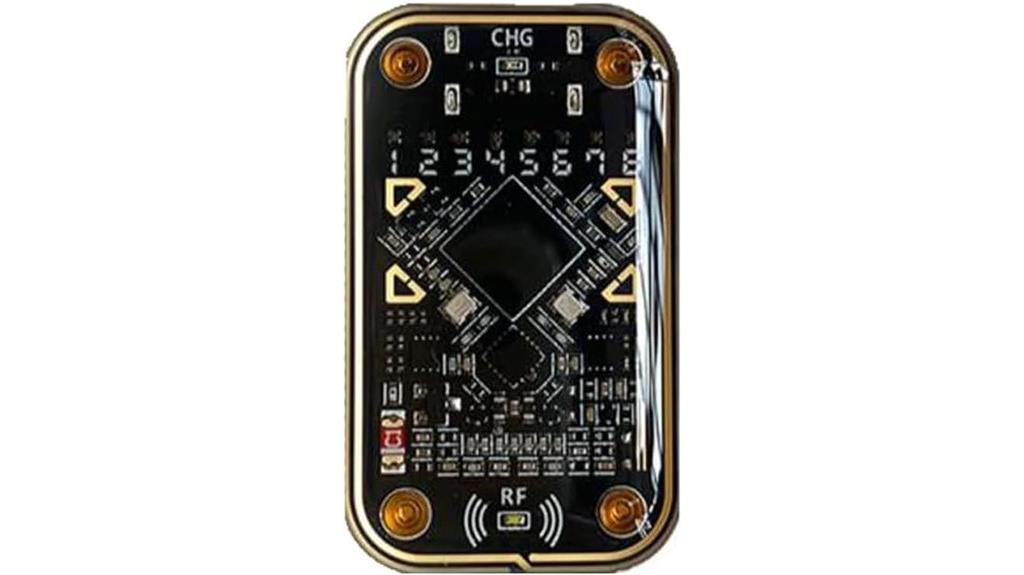
If you’re looking for a compact RFID emulator that offers versatile cloning and testing capabilities, the Chameleon Ultra stands out as an ideal choice for security professionals, engineers, and hobbyists working with access control systems. This portable device can clone, emulate, and analyze both HF and LF RFID tags, making it perfect for troubleshooting and security testing. It transmits programmed data using Lua and supports NFC, enabling flexible use in the field. Despite some user-reported issues like connection problems and limited LF card reading, its small size, ease of use, and ability to emulate different systems make it a valuable tool for testing RFID security and replacing lost credentials.
Best For: security professionals, engineers, and hobbyists seeking a portable, versatile RFID cloning and testing device for access control systems.
Pros:
- Supports cloning and emulation of both HF and LF RFID tags, enhancing testing versatility.
- Compact and portable design makes it easy to carry and use in various environments.
- Can transmit data using Lua and supports NFC, allowing flexible and customizable operations.
Cons:
- Some users report difficulty reading LF (125 kHz) cards and connectivity issues via USB or Bluetooth.
- Firmware updates can be complex, often requiring technical knowledge and specialized tools.
- Occasional reports of units arriving used, with discharged batteries or missing accessories, affecting reliability.
RFID Handheld 125kHz Copier RFID Card Duplicator with 5 ID Cards and Keychains
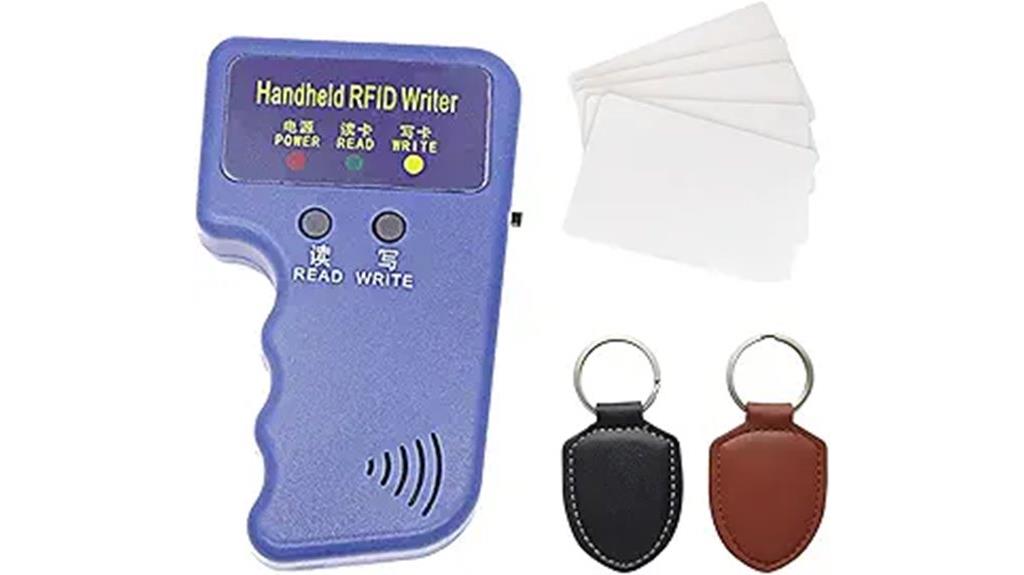
The RFID Handheld 125kHz Copier RFID Card Duplicator with 5 ID Cards and Keychains is an ideal choice for individuals who need a portable and easy-to-use solution for low-frequency RFID duplication. Weighing just 56 grams, it’s compatible with all 125kHz RFID smart products, including T5577, EM4100, EM4305, and TK4100 chips. The device reads, writes, and duplicates cards by using external commands, but requires programming before use. It’s perfect for copying parking, access, or switch cards, especially small or irregular-shaped ones. Powered by 2 AAA batteries, it offers a quick, reliable way to clone RFID cards on the go.
Best For: individuals needing a portable, easy-to-use RFID duplication tool for low-frequency cards, such as security personnel, parking lot attendants, or small business owners.
Pros:
- Compact and lightweight design (56g) for easy portability
- Compatible with all 125kHz RFID smart products, including T5577, EM4100, EM4305, and TK4100 chips
- Reusable with external commands, allowing multiple duplications after proper programming
Cons:
- Cannot operate without prior command programming; not a plug-and-play device
- Limited to duplicating one card per programming cycle, requiring reprogramming for multiple copies
- Only suitable for low-frequency RFID cards; cannot read or write chips with different protocols
Multi Frequencies RFID Reader Writer and Duplicator with Writable Key Fobs
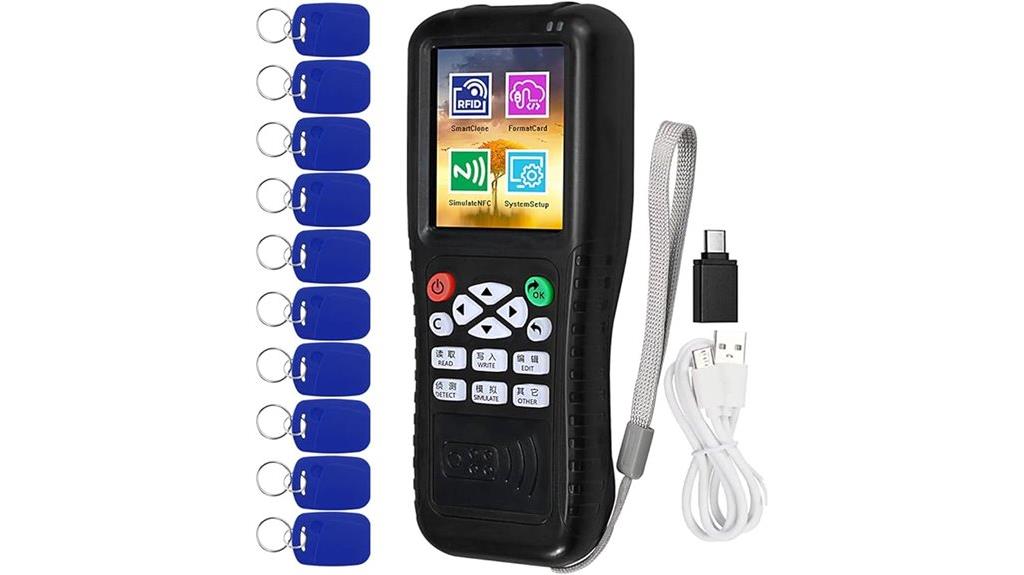
For those managing access control systems, the Multi Frequencies RFID Reader Writer and Duplicator with Writable Key Fobs offers a versatile solution that supports a wide range of RFID card types and frequencies. It handles IC, MF1, S50, S70, ID, TK4100, EM4100, HID, GID, SID cards across frequencies from 125KHz up to 13.56 MHz. The device features a color touchscreen, voice prompts, and can decode encrypted cards, even writing data to compatible Android NFC phones. It includes rewritable key fobs and cards, but users must verify card types and frequencies to guarantee successful reading and writing. It’s ideal for access control and hobbyist use.
Best For: individuals and small businesses managing access control systems who need a versatile RFID reader/writer with wide frequency support and writable key fobs.
Pros:
- Supports a broad range of RFID card types and frequencies, enhancing compatibility.
- Features a full-color touchscreen, voice prompts, and decoding capabilities for encrypted cards.
- Portable handheld design with rechargeable batteries and smartphone connectivity via OTG.
Cons:
- Compatibility limited to access control RFID cards; cannot read or write induction or non-compatible RFID cards.
- Some cards may be non-writable or require specific rules, leading to potential writing failures.
- Limited suitability for extensive RFID cloning needs due to compatibility and card type restrictions.
Factors to Consider When Choosing RFID Cloning Tools
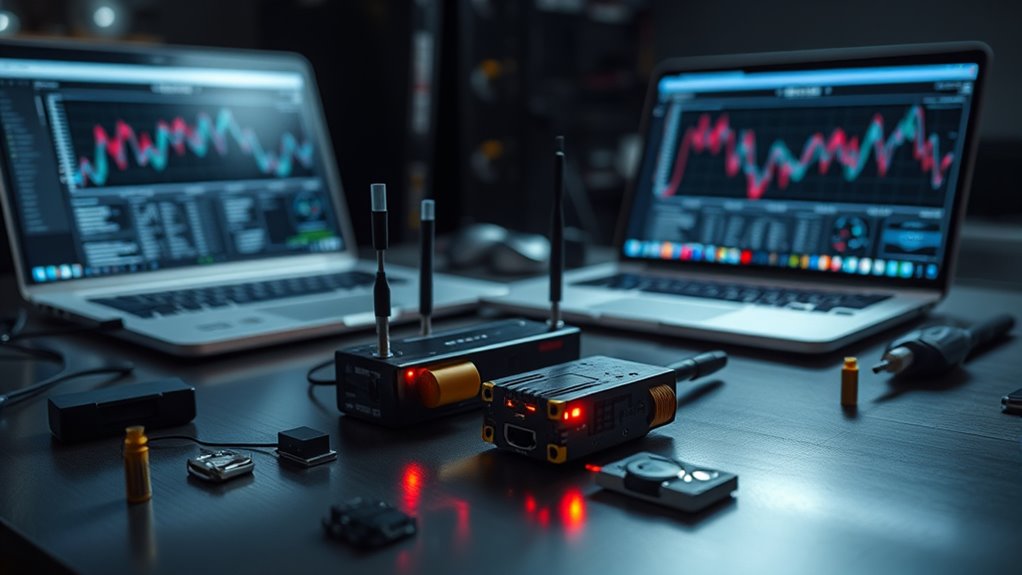
When selecting RFID cloning tools, I focus on compatibility with different card types and the supported frequency ranges to guarantee versatility. Ease of use and reprogramming capabilities are also vital, so I can operate the device efficiently and reuse it as needed. Additionally, I consider power supply options to match my setup and secure uninterrupted performance.
Compatibility With Card Types
Choosing an RFID cloning tool that supports your specific card types is essential for guaranteeing seamless reading and copying. You need to verify that the device works with the chip type of your cards, such as T5577, EM4100, EM4305, or TK4100, to avoid compatibility issues. It’s also important to check if the tool operates at the correct frequency, typically 125kHz or 13.56MHz, matching your cards’ working frequency. Additionally, consider whether the device can handle different card shapes and sizes, like key fobs or irregularly shaped cards, to suit your needs. If you deal with encrypted or semi-encrypted RFID cards, ensure the tool supports reading and writing these with the necessary software or decoding features. Compatibility ensures reliable performance across your card collection.
Frequency Range Support
Supporting the correct frequency range is fundamental when selecting an RFID cloning tool because it directly impacts the device’s ability to read and replicate your cards accurately. Different RFID cards operate at specific frequencies, like 125kHz or 13.56MHz, so it’s essential to verify that your device supports these. Multi-frequency tools are advantageous—they can clone cards across various bands, increasing versatility. Some advanced models even cover LF, HF, and UHF ranges, allowing broader compatibility. Without matching the correct frequency, the device may fail to read or clone your RFID credentials properly, leading to operational issues. Ensuring the tool supports your target frequency range prevents wasted time and effort, making your cloning process smooth and reliable. Always check the supported spectrum before making a purchase.
Ease of Use
A user-friendly RFID cloning tool makes the entire process much more efficient and less frustrating. I look for devices with straightforward workflows that let me read, write, and duplicate cards with minimal steps. Intuitive interfaces, like clear buttons and visual cues such as lights or sounds, make operation simple, even for beginners. Support for manual input of commands or card numbers adds flexibility, allowing me to handle different RFID types easily. Compatibility with common operating systems and minimal setup requirements also matter, ensuring I spend less time configuring and more time cloning. Additionally, clear instructions, tutorials, or customer support options give me confidence during the process. Overall, an easy-to-use tool reduces complexity and helps me achieve my goals quickly and efficiently.
Reusability and Reprogramming
Ever wondered how many times you can reuse and reprogram an RFID card with a single cloning device? Reusability is essential because it determines how often you can read, copy, and write data onto the same card without losing quality. A good RFID cloning tool should handle multiple cycles without degradation, ensuring consistent performance. Reprogramming flexibility matters too; the ability to update or modify data makes the device more versatile. Some tools allow you to clone a card once and then reprogram it repeatedly, saving time and resources. When choosing a device, look for one that offers high reusability and straightforward reprogramming features, so you can adapt to different security needs without constantly switching equipment. This saves you money and enhances your overall experience.
Power Supply Options
Choosing the right power supply for an RFID cloning tool is essential because it directly impacts the device’s portability and reliability. If you need a tool for on-site or field use, battery-powered options like AA batteries or rechargeable lithium batteries are ideal. Battery types vary; some devices specify needing 2 AAA batteries, while others feature built-in rechargeable batteries. Rechargeable lithium options offer convenience, allowing multiple uses per charge, but require charging accessories or cables. Power stability and capacity are vital—insufficient power can cause read/write failures or unreliable duplication. I always consider how portable I need the device to be and whether I prefer the convenience of rechargeable batteries or the simplicity of disposable ones. Ensuring a reliable power source keeps my workflow smooth and prevents interruptions.
Software and Connectivity
Selecting the right RFID cloning tool involves more than just hardware; connectivity options and software compatibility play a vital role in overall performance. I look for devices that support multiple connectivity methods like USB, Bluetooth, or OTG, ensuring flexible data transfer and easy pairing with various devices. The software should be compatible with my operating system—whether Windows, Android, iOS, or macOS—for smooth operation. I also prioritize tools that include dedicated decoding software or firmware updates, which enhance functionality and address security issues. Real-time data reading and writing capabilities are essential for efficient cloning without manual hassle. Finally, a user-friendly interface with clear instructions and troubleshooting support makes the device reliable and easy to use, saving me time and frustration.
Security and Ethical Use
Since RFID cloning tools can pose serious security and legal risks, it’s crucial to use them responsibly and ethically. Unauthorized duplication of secure cards can break laws and lead to serious legal consequences. Always obtain proper consent from cardholders and follow relevant security policies. Cloning RFID credentials without permission can enable theft, fraud, or unauthorized access, creating significant security vulnerabilities. Responsible handling also means safeguarding any cloned data to prevent misuse and respecting privacy rights. Being aware of the potential security implications and misuse of these tools helps ensure ethical practices. Using RFID cloning devices ethically isn’t just about legality; it’s about protecting individuals and organizations from harm. Always prioritize consent, security, and compliance when working with these powerful tools.
Frequently Asked Questions
What Legal Restrictions Exist for RFID Cloning Device Usage?
Using RFID cloning devices is heavily regulated and often illegal without explicit permission. I always make sure I have proper authorization before attempting any cloning, as unauthorized use can lead to hefty fines or criminal charges. Laws vary by country and state, but generally, cloning for malicious purposes or without consent breaches privacy laws. It’s essential to stay informed and respect legal boundaries to avoid serious consequences.
How Secure Are Cloned RFID Devices Against Detection?
It’s a bit of a cat-and-mouse game. Cloned RFID devices can often fly under the radar if done carefully, but they’re not foolproof. Skilled security systems can detect anomalies or unauthorized clones, especially with advanced monitoring. So, while cloned RFID cards might seem secure at first glance, savvy security measures keep them on their toes, making detection increasingly possible with the right tools and techniques.
Can These Tools Clone Encrypted RFID Cards?
Yes, some advanced RFID cloning tools can copy encrypted cards, but it’s not always straightforward. Encryption adds a layer of security that makes cloning more difficult, requiring specialized equipment and expertise. I recommend understanding the specific encryption standards of the card you’re dealing with. While cloning is possible with the right tools, doing so without authorization is illegal and unethical, so always guarantee you’re compliant with laws and regulations.
What Is the Typical Cost Range for Top RFID Cloning Tools?
The typical cost for top RFID cloning tools ranges from around $200 to $2,000, depending on their features and capabilities. I’ve found that basic devices usually fall on the lower end, suitable for hobbyists, while professional-grade tools with advanced features can be quite expensive. If you’re serious about security testing, be prepared to invest accordingly. Always remember, using these tools responsibly is vital to avoid any legal issues.
How Do Software Updates Affect Device Compatibility?
Imagine a vintage radio tuning in to a new frequency—that’s how software updates affect device compatibility. They often improve functionality and patch bugs, but sometimes they introduce conflicts with older hardware. I’ve seen updates make devices more versatile, yet, occasionally, they cause compatibility issues. Staying informed and choosing updates carefully helps guarantee your RFID cloning device works smoothly, much like tuning a radio for the clearest signal.
Conclusion
In my experience, choosing the right RFID cloning tool depends on your specific needs. For example, I once helped a security team quickly duplicate access cards during a system upgrade, saving hours of manual work. Whether you’re a security enthusiast or need reliable duplication for access management, understanding these top devices guarantees you pick the best for your situation. Always prioritize security and legality—use these tools responsibly and ethically.
